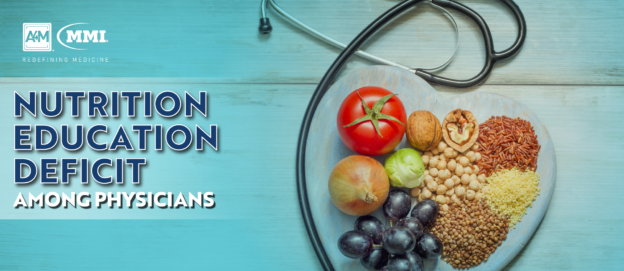Despite the continuous medical focus on obesity, nutrition, and diet-related diseases, many internal medicine training programs still lack comprehensive nutrition education modules, leaving residents and physicians inadequately equipped to handle many related conditions – including the pervasive obesity health crisis. A commentary published in JAMA Internal Medicine in July underscores the persisting need for nutrition knowledge for today’s physicians.
Gaps in Nutritional Knowledge
According to author Neal Barnard, MD, president of the Physicians Committee for Responsible Medicine, a non-profit organization that promotes higher standards for ethics in education and research, doctors lack adequate knowledge in the field of nutrition. Correspondingly, 61% internal medicine residents reported having little to no training in nutrition in a 2018 survey assessing levels of nutrition education across training programs in the United States. Revealing not only a lack of knowledge the study found a lack of resident interest in providing dietary counseling, implicating the potential need for mandatory nutritional education in training programs as well as a systematic national reassessment of training program curricula.
In a separate survey , 94% of resident physicians agreed that nutrition counseling should be incorporated into patient visits and recognized the importance of a healthy diet. However, only 14% of them felt adequately trained in the field and prepared to offer such services.
Effects on Patient Health Outcomes
Poor nutrition has long been linked to obesity, diabetes, heart disease, and a host of other conditions affecting millions of individuals nationwide. Although a substantial body of research supports the beneficial effects of a healthy diet rich in fruits, vegetables, and whole grains on overall health, the less than 10% of U.S. adults meet minimum vegetable intake guidelines and only 12.2% consume enough fruit. Dr. Barnard’s commentary emphasizes the crucial nature of nutrition knowledge for physicians as effective dietary counseling can have a profound effect on patient health outcomes.
In certain cases, the lack of nutrition education in physicians can lead to detrimental health outcomes for patients whose conditions could have been significantly improved through dietary changes. Dr. Barnard mentions one such case in his commentary in which a patient hospitalized with a foot infection – a diabetic complication – was recommended amputation although sufficient nutritional alterations could have ameliorated insulin resistance and even diabetes itself. Without proper nutrition education, physicians may be at risk of making invasive recommendations prematurely and potentially harming their patients.
Intervention Strategies
In an effort to ameliorate the pervasive deficit in nutrition education among physicians, Dr. Barnard recommends the medical community make systematic changes to internal medicine training programs. Nutrition should be a mandatory element of continuing medical education for physicians across the globe and doctors should work with registered dietitians to monitor and support patient nutritional needs. In addition, electronic medical record services should begin to include nutrition questions that can be customized to fit individual needs. Finally, Dr. Barnard calls for the support of not only physicians but the medical community as a whole to promote healthy eating habits and food environments.
Although the recent commentary reveals the concerning status of nutritional knowledge and dietary counseling among American internal medicine practitioners, not all specialties disregard the area of study. For instance, the rapidly growing specialty of integrative medicine, which assumes a holistic approach to patient care, combines nutrition, disease prevention, and overall health promotionto prevent, treat, and manage individual health concerns. Despite such efforts in other specialties, the current deficit in nutrition knowledge among physicians requires immediate remediation and a comprehensive re-evaluation of present medical education programs of study.

